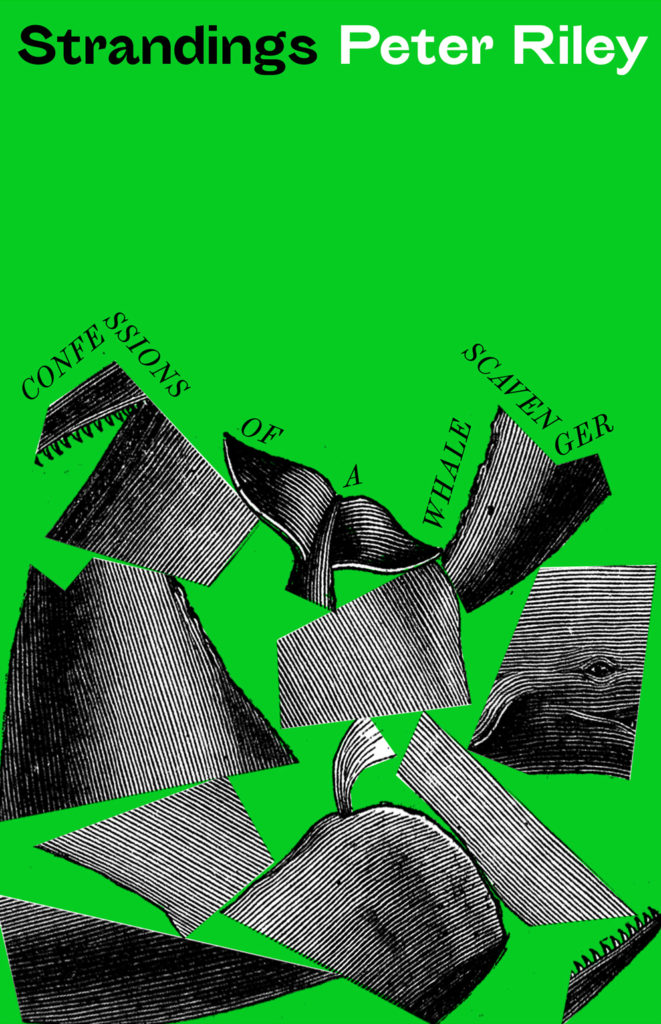Peter Riley’s ‘Strandings: Confessions of a Whale Scavenger’, published by Profile Books next week, is our February Book of the Month. It isn’t a book about whales-as-persons, but instead about how weird humans get around them, writes Abi Andrews.

What do stranded whales have to say about Brexit? What do stranded whales have to say? What should you do if they won’t stop talking to you? This is the feverish investigation at the centre of Peter Riley’s Strandings: Confessions of a Whale Scavenger. With the gusto of the obsessed and the precision of a Melville scholar (literally, he lectures in Herman Melville at Exeter Uni), Riley takes us on a specifically British cultural tour of whale strandings, via the subculture of whale scavengers of which he is part — those that raid the carcasses and make off with their possessions: teeth, a hacked off jawbone, an ocular souvenir.
This shady hobby amounts to a wildlife crime, and as such, at the same time that it is confessional and personally situated, Riley’s account of his fellows is given with ‘a degree of lateral drift’. Whales themselves are bloated corpses, and their almost slapstick and fetishised appearance is discomforting at first. Are whale scavengers not a macabre presence, looting cerebral beings, and is the reader not a dark tourist, sickened by their own fascination? Riley speaks directly to this apprehension, calling us out for bleating at violence against particular animals, while ‘remaining compliant in the greatest extinction event since the Cretaceous-Paleogene comet’. He wants to redeem this act of scavenging to us. Chastened, we plough on.
Whales are omens, comets, ‘Royal Fishe’. This isn’t at all a book about whales-as-persons, but instead about how weird humans get around them. The scavengers are presented in the tradition of The English Eerie: this is the skull beneath the skin of the countryside, or rather the whale-tooth buttplug on the beach. Riley’s account is itself one long palimpsest, manifest of his periscopic reading and decades-long occupation: page-long footnotes, verbatim 17th century pamphlet titles that are paragraphs long, curious archival images, and incendiary one-liners. His archival mine is enlivening and heady. The whales pile up, accumulating like frothing flotsam.
This book teeters — between morbid-profound, personal-political, and sometimes sweet-creepy. The blue-haired woman that ignited Riley’s fascination one day on holiday as a teenage boy becomes the unknowing quarry of a stalkerish quest that eventually takes Riley to a care home, where he intends to elicit information from her confused and elderly mother. But the ethical ambiguity at play in the book is never denied by its author; this seems an all-access confessional.
What starts as a personal breakdown (whales that won’t stop appearing, a panic attack on a beach in Skegness) becomes parable of societal disintegration. After Mark Fisher, Riley begins to see the whale runes as indicative of broader social issues in the capitalocene. Like early Victorian illustrations of whales of cartoonish proportions (of which this book has delightfully many) say more about the context-in-which-they-were apprehended (bloated on land, half glimpsed and harpooned in stormy seas) Strandings too has more to say about the context and environment of post-2008 seaside England than the whales that strand there; seaside towns some of the hardest hit by Tory austerity, the beached whales washed up imperial pride.
Riley finds some eventual reprieve from the whales by embracing his own entanglements with them. Thanks to Donna Haraway, he realises whales are his ‘companion species’, that ‘[he is] who [he becomes] with companion species’. And although I’m not fully convinced the whales would consider themselves companions to the scavengers, or that the scavenging of their teeth is companionable, Riley’s resolutions are otherwise original and compelling. He escapes the burden-curse that the blue-haired woman handed to him by passing it on again; the whales aren’t just addressing Riley — they are saying something to us all.
The scavengers come in with chisels to pull the whales’ teeth, not because they are morbid, but because they are morticians. This is an addictive and scandalously fascinating book written from the centre of a storm of obsession. You will finish feeling spun out and tugged into the maelstrom that is Riley’s whales.
*
‘Strandings’ is published this Thursday. Order a copy here (£14.00). Read an extract from the book here.
Join us to celebrate the launch of ‘Strandings’ at The Social, London, on Monday 7 March, where Peter will read alongside Patrick Barkham, Jess Streeting and Katherine Venn. More info and tickets available here.